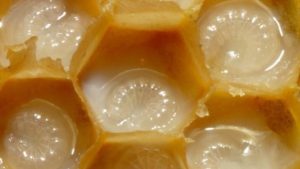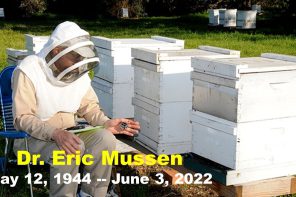I remember meeting up with some beekeepers in Vancouver 25 years ago and talking about the amazing medicinal properties of propolis. They were not impressed. One beekeeper told me they had been trying to breed out the tendency of their black bees to produce large amounts of the stuff. Propolis for them was a nuisance which caused them no end of irritation and trouble in connection with the main purpose of beekeeping, i.e. the production of honey!
In the 25 years that have elapsed since that meeting, research into the medicinal properties of propolis has increased exponentially with hundreds of papers now being published every year from research institutions all over the world. My own work includes publishing two books about propolis and contributing to around 30 peer reviewed research papers including papers illustrating how propolis is effective against MRSA.

11 years ago, I started ARC (Apiceutical Research Centre, www.apiceuticalresearchcentre.org) to research and develop Apiceuticals (medicines from bee products) and Sustainable Beekeeping. ARC organised the first conference ever inthe UK on medicines from the beehive with the ambitious title – Apiceuticals: Future Medicine?

Six years ago, I started the IPRG (International Propolis Research Group, www.iprg.info) which every two years has brought academics together from around the world for a conference: Propolis: In Human and Bee Health. Our last physical conference in Sofia, Bulgaria attracted over 125 researchers with over 40 papers presented. Our next physical conference planned for Istanbul in 2020 had to be postponed because of COVID, but the stream of research including clinical research into the use of propolis did not stop. Clinical trials research began to appear about the use of propolis in treating COVID, upper respiratory tract infection and metabolic syndrome i.e. diseases connected with COVID, like Diabetes and Obesity. Rather than waiting for COVID to abate and for travel to be allowed again, the IPRG decided to explore an online conference. Would contributors come? Would there be any participants? It was stressful but highly successful. Over 3000 people viewed the conference Propolis: Medicine for the Future? with 400 fulltime participants from 90 countries and 40 papers presented.
At ARC we presented a paper showing how propolis combined with antibiotics can radically improve their efficiency and reduce the side effects.

Suddenly propolis is being talked of as a new medicine rather than a nuisance. It has become a bridge between traditional natural medicines/herbal medicines and pharmaceutical medicines and is proving to be a real contender in the fight against antibiotic resistance, now defined by WHO as a global health challenge.
Global interest in the medicinal properties of propolis is now a reality. Propolis though is a new medicine which works by stimulating our immune system, by disabling bacteria and viruses rather than destroying them. Propolis, more than any other natural substance, is leading the way towards a more holistic, gentler, and ultimately more humane and effective medicine of the future.

About the Author
James Fearnley has been researching the amazing properties of propolis for over 30 years working with universities around the world, publishing two books: Propolis: Natural Healing from the Hive Souvenir Press and Propolis and Oral Health – Dispensary Press.
James has travelled the world too collecting propolis samples to analyse back home in Whitby North Yorkshire, contributing to over 30 peer review journals exploring the many ways that propolis can help with human health.
BeeVital produces the largest range of high quality propolis products in the UK backed up by decades of research managed by their own trained chemists and researchers in their own laboratories. www.beevitalpropolis.com
Apiceutical Research Centre www.apiceuticalresearchcentre.org was founded by James in 2010 and has built an international community of researchers looking at how propolis works for both the honey bee itself and for man.








